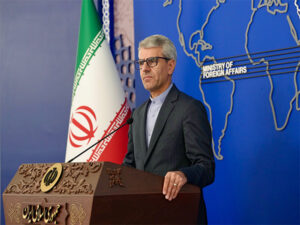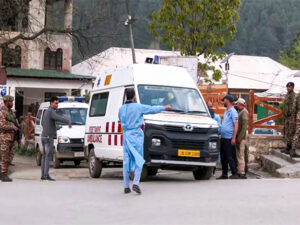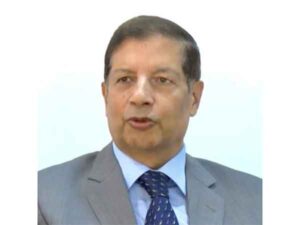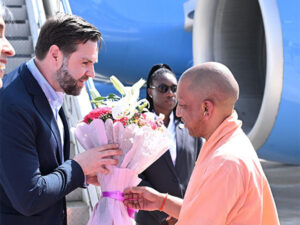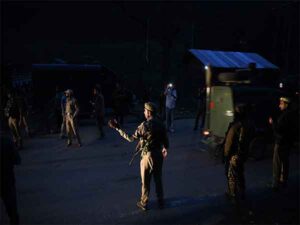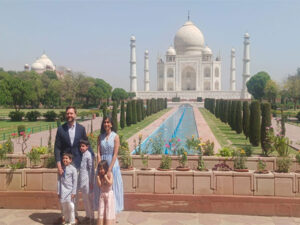After talks, ‘close friends’ Xi and Putin say China, Russia ties stabilising factor for world, conducive to peace
Beijing, May 16 (PTI) Chinese President Xi Jinping and his Russian counterpart Vladimir Putin on Thursday said ties between the two countries have become a stabilising factor for the world and a fine example for other countries, as the two leaders met here amidst mounting pressure over Beijing to scale down support to Moscow over its prolonged war in Ukraine.
Putin arrived here on Thursday on his first foreign visit, days after being re-elected for the fifth term in power in the midst of Russia’s raging war with Ukraine.
Welcoming Putin on his two-day visit, Xi said celebrating the 75th anniversary of the China-Russia diplomatic ties is a defining theme.
“Having lasted three quarters of a century, China-Russia relations have grown from strength-to-strength despite the ups and downs, and have stood the test of changing international landscape,” he said in his talks with Putin whom he regards as a close friend.
“The relationship has become a fine example for major and neighbouring countries to treat each other with respect and candour, and pursue friendship and mutual benefit,” he said, without referring to Russia’s Ukraine war over which the US and EU are increasing pressure on Beijing to use its influence over Moscow to halt it.
Xi said he and Putin have met more than 40 times and stayed in close communication, providing strategic guidance that has ensured the sound, steady and smooth development of the relationship.
“The China-Russia relationship today is hard-earned, and the two sides need to cherish and nurture it,” Xi said.
“Steady development of China-Russia relations is not only in the fundamental interests of the two countries and the two peoples but also conducive to peace, stability and prosperity of the region and the world at large,” he said.
Calling Xi “my dear friend”, Putin in his speech said “it is of fundamental importance that relations between Russia and China are not opportunistic and are not directed against anyone”.
“Our cooperation in world affairs today serves as one of the main stabilising factors in the international arena,” he said, according to a report by Russian news agency Tass.
Putin also said Russia is open to a dialogue on Ukraine.
“We are open to a dialogue on Ukraine, but such negotiations must take into account the interests of all countries involved in the conflict, including ours,” Putin was quoted as saying by China’s official Xinhua News Agency.
Russia and China are successfully cooperating in the United Nations, BRICS, SCO and G20, Putin said.
“We are determined to further harmonise integration processes in the Eurasian space, to combine the potential of the Eurasian Economic Community and your, my dear friend, Belt and Road Initiative (BRI),” the Russian leader said.
The BRI is a multi-billion-dollar initiative launched by President Xi when he came to power in 2013. It aims to link Southeast Asia, Central Asia, the Gulf region, Africa and Europe with a network of land and sea routes.
Putin expressed hope that his current visit would give an additional impetus to the development of the entire complex of bilateral cooperation.
“I would like to emphasise: I am very happy to arrive in China and to meet with you,” Putin told Xi.
This is Putin’s second visit to Beijing since last October.
Soon after Putin arrived at the historic Great Hall of People, the seat of power of the ruling Chinese Communist Party, Xi held a welcome ceremony which included a guard of honour by the People’s Liberation Army (PLA) contingent.
After 15 minutes’ ceremony the two leaders, who over the years have become close friends and allies, went in for talks.
Highlighting the significance of Putin’s visit, Yury Ushakov, the Russian presidential foreign policy aide, said that China was not randomly chosen for Putin’s first foreign trip, but as a response to a similar gesture of friendship made by Xi last year after his election for an unprecedented third term.
Putin has brought a large delegation consisting of five deputy prime ministers, heads of economic, diplomatic and security agencies, as well as heads of the Federal Service for Military-Technical Cooperation, Russian Railways, Rosatom State Nuclear Energy Corporation and the Roscosmos State Corporation for Space Activities, Russian news agency Tass reported.
In addition, senior officials from 20 Russian regions are also accompanying Putin.
The bilateral talks are expected to focus on trade and economic cooperation, besides the strategic environment arising from Putin’s war over Ukraine, which also brought pressure on China from the US and EU to distance itself from Moscow.
China has become the largest beneficiary of Russia’s oil and gas during the Ukraine war.
Putin’s visit to China, the second since last October, follows Xi’s just concluded European Union tour to France, Serbia and Hungary.
In his talks with French President Emmanuel Macron and EU Commission chief Ursula von der Leyen, Xi pledged that China would not sell arms to Russia and would control the flow of dual-use goods to its military.
The US too is mounting pressure on China not to sell arms to Russia to further its war in Ukraine.
While Xi, 70, regards his ties with Putin, 71, as counter to the US’ increasing hostility towards China, which Beijing says is aimed at countering its rise, there is unease here over Putin’s continuation of the Ukraine war.
Though Beijing has not publically supported Russia’s invasion of Ukraine, the no-limits China-Russia strategic partnership has come under intense scrutiny from the US and its allies, who have imposed sanctions on Moscow and repeatedly called Beijing to use its leverage to bring the war to an end.
The second stage of Putin’s two-day state visit to China will take place in the city of Harbin, the capital and largest city of Heilongjiang Province.
There, Putin will attend the opening ceremony of the 8th Russian-Chinese Expo and the 4th Russia-China Forum on Interregional Cooperation, and will also meet with the students and teaching staff of the Harbin Institute of Technology.

